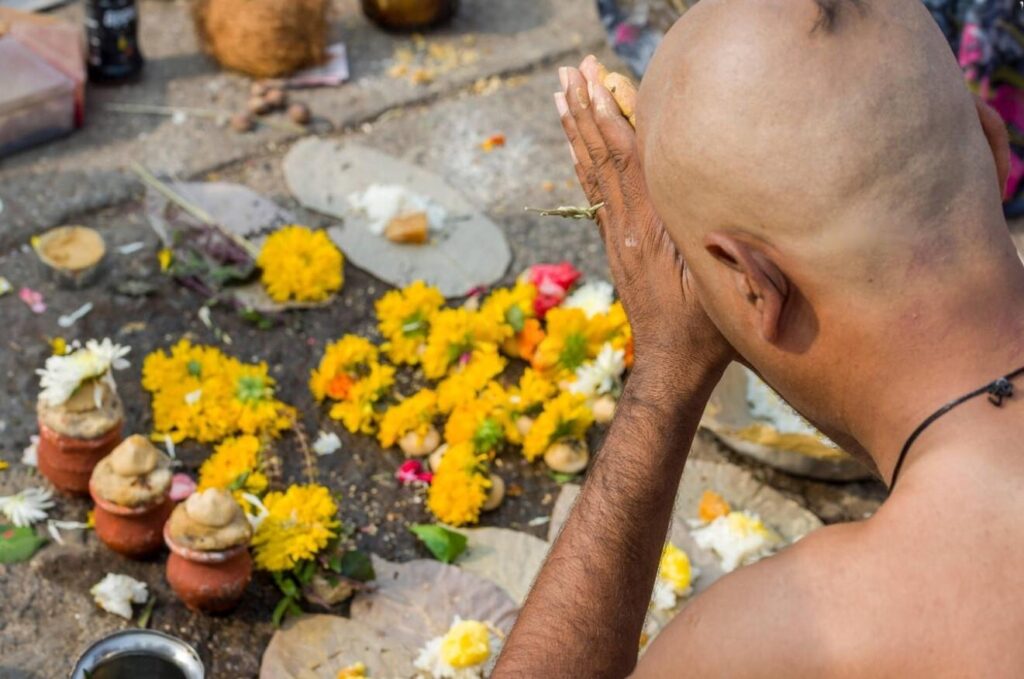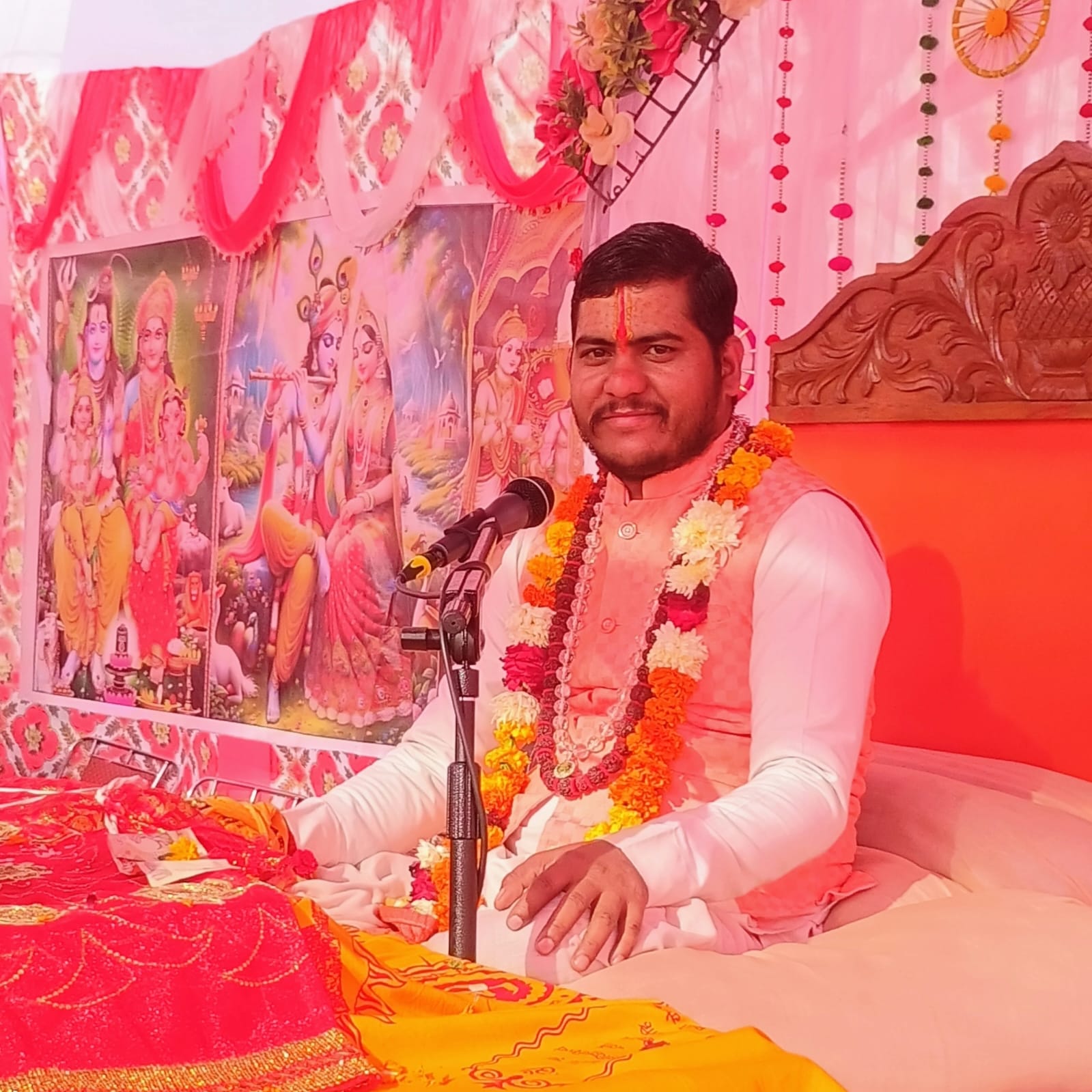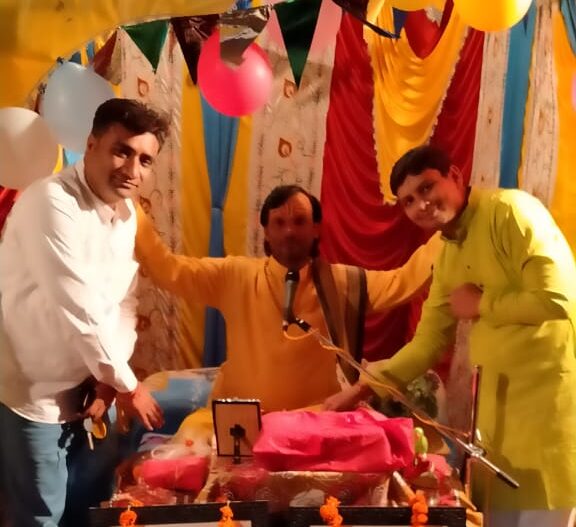
Tri-Pindi Shradh
Tripindi Shradh is an important Hindu ritual performed to appease the souls of the deceased ancestors, particularly when they are believed to be suffering in Pitra Loka (the realm of ancestors). The ritual is designed to provide peace and relief to three generations of ancestors—father, grandfather, and great-grandfather—whose souls are believed to be stuck or unfulfilled due to improper or incomplete last rites, or because they did not receive proper offerings. The term “Tripindi” comes from the words “Tri” (three) and “Pindi” (rice balls, also called tarpan or pindadaan), indicating the three generations being honored during this ritual.
Purpose of Tripindi Shradh:
Relieving Souls in Pitra Loka: According to Hindu belief, if ancestors did not receive proper offerings after their death, their souls might remain in an unsettled state or “preta” (spirit), which could cause misfortune or suffering to their descendants. The Tripindi Shradh is performed to release them from this state and to ensure that their souls are peacefully moved to Pitra Loka or to attain liberation (moksha).
Breaking Ancestral Bondage: The ritual helps remove any ancestral curses or karmic debts that might be affecting the living members of the family. It is often performed when a family feels it is suffering from bad luck or when ancestral spirits are believed to be disturbing the family members.
Relieving Pitra Dosha: Pitra Dosha refers to the negative consequences or afflictions believed to be caused by unfulfilled or improper last rites of ancestors. This dosha can manifest as health problems, financial instability, or relationship issues within the family. The Tripindi Shradh ritual is performed to alleviate these difficulties.
Ensuring the Peace of Three Generations: The three Pindis (rice balls) symbolize the ancestors of three generations—father, grandfather, and great-grandfather—and are offered to ensure that the souls of these ancestors attain peace and liberation.
When is Tripindi Shradh Performed?
Timing: Tripindi Shradh is typically performed during the Pitr Paksha, the 15-day period in the Hindu lunar calendar dedicated to honoring and performing rituals for deceased ancestors. It is generally done during the Amavasya (new moon day) of Bhadrapad or Ashvin (August–October), when ancestral rites are considered especially potent.
Special Occasions: It can also be performed if a family has not conducted proper Shradh ceremonies for their ancestors or if there are specific astrological factors (like Pitra Dosha) affecting the family. The ceremony is particularly significant if a family feels that they have not completed the necessary rites for their ancestors.
Steps in Tripindi Shradh:
Preparation:
- The ritual is typically performed by the eldest male member of the family or a priest (Brahmin) on behalf of the family. The ceremony is conducted in a clean and sacred space, often near a river or sacred place. The family prepares offerings such as pindis (rice balls), sesame seeds, ghee, milk, and fruits.
Creation of Three Pindis:
- The central aspect of Tripindi Shradh involves making three pindis (rice balls), which represent the three generations of ancestors being honored—father, grandfather, and great-grandfather. These pindis are prepared with rice, barley, sesame seeds, and ghee, and sometimes, other ingredients like flour or milk are added.
Invocation of Ancestors:
- The priest or family member conducting the ritual invokes the blessings of Lord Vishnu, and the ancestors are called upon to receive the offerings. The family recites sacred mantras, including the Pitr Mantras, Narayan Mantras, and other prayers to seek the blessings of the ancestors and to ensure their peace.
Offering of the Pindis:
- The three rice balls (pindis) are offered to the ancestors. The priest or family member places the pindis on a leaf, on the ground, or in a water body (like a river or pond). These offerings are considered symbolic of providing nourishment to the souls of the ancestors, ensuring their peaceful transition to the afterlife.
Tarpan (Water Offering):
- Water is offered along with sesame seeds (til) and barley (yava), in a ritual called tarpan. The water, along with these items, is offered to the ancestors, ensuring that their souls are at peace and their thirst for spiritual nourishment is quenched. This offering is also seen as a way of expressing gratitude to the ancestors.
Feeding Brahmins and the Poor:
- As part of the Tripindi Shradh, it is customary to feed Brahmins (priests) or the poor as an act of charity, which is believed to bring blessings to the family. This feeding is done as an offering to the ancestors, and it is also thought to earn spiritual merit.
Completion of Rituals:
- After the offerings, the priest recites concluding mantras and prayers to ensure that the souls of the ancestors are freed from any unresolved karma and are granted peace. This part of the ritual represents the final release of the ancestors’ spirits, symbolizing their transition to the divine realm or eternal peace.
Significance of Tripindi Shradh:
Ancestral Peace and Liberation:
- The primary aim of Tripindi Shradh is to provide peace and liberation to the ancestors of the family. By performing the ritual, it is believed that the ancestors’ souls will be released from any suffering or unrest and will attain the highest form of spiritual liberation (moksha).
Removing Ancestral Curses:
- If the family is experiencing repeated misfortunes, illness, or financial instability, it is believed that these could be caused by ancestral curses or unfulfilled ancestral rites. The Tripindi Shradh is performed to eliminate these curses and to restore balance and prosperity to the family.
Relieving Pitra Dosha:
- Pitra Dosha is the negative karmic effect caused by neglecting ancestral rites or by the wrongdoings of ancestors. The Tripindi Shradh is believed to mitigate Pitra Dosha and prevent its adverse effects on the descendants.
Family Harmony and Prosperity:
- The ritual is also seen as a means to bring harmony and peace to the family. It is believed to alleviate tensions, resolve unresolved family matters, and restore prosperity and health to the living members of the family.
Conclusion:
The Tripindi Shradh is a powerful ritual in Hinduism to honor and appease the souls of deceased ancestors, particularly those whose souls may still be suffering or are believed to be unsettled. By performing this ritual, families seek peace and liberation for their ancestors and remove any negative influences, ensuring the well-being and prosperity of the living members. It is a meaningful practice to fulfill one’s spiritual duties to ancestors and to maintain harmony within the family.
Our Priest (Acharyas)

Acharya Pandit Sachin Anthwal ji
Acharya Sachin Anthwal began his educational journey at Shri Ved Mahavidyalaya, Rishikesh, where he received profound knowledge of the Vedas and scriptures. He later completed his Master's degree in Hindi from Hemwati Nandan Bahuguna Garhwal University and obtained his B.Ed degree from Kurukshetra University, Haryana. Since 1996, Acharya Sachin Anthwal has been actively working in the fields of Pooja, Astrology, Vastu, Palmistry, and all types of rituals. With his vast experience and deep knowledge, he has become a prominent figure in this field, helping bring positive transformation to individuals' lives.

Acharya Pandit Pradeep Tailwal
Acharya Pandit Pradeep Tailwal is a highly experienced spiritual guide with over 16 years of expertise in the fields of Pooja, Astrology, Vastu, and various rituals. With a deep understanding of ancient scriptures and spiritual practices, he has helped countless individuals achieve peace, prosperity, and harmony through his insightful guidance and rituals. His years of dedication and profound knowledge make him a trusted and respected figure in the spiritual community.

Acharya Pandit Uday Kar Pant
Acharya Pandit Uday Kar Pant brings over 18 years of profound experience in the fields of Vedic rituals, Astrology, Vastu Shastra, and Spiritual Counseling. Known for his deep spiritual wisdom and practical approach, he has helped numerous individuals overcome life's challenges through his accurate astrological insights and personalized spiritual solutions. His commitment to preserving traditional practices while adapting to modern needs has made him a trusted guide for those seeking spiritual growth and harmony.

Pandit Sanjay Krishna Ji
Pujya Param Shraddheya Saras Katha Vyas Acharya Pandit Sanjay Krishna Ji was born in Uttarkashi, near the sacred Yamunotri Dham. He is an accomplished spiritual guide, renowned for his deep knowledge and discourses on various sacred texts, including Ram Katha, Shreemad Bhagwat Katha, Shiv Mahapurana Katha, Gau Katha, and Shreemad Devi Bhagwat Katha. With over 7 years of experience in delivering these divine teachings and 10 years of expertise in Astrology and Karmakand, he has been actively serving the spiritual community. Currently, he is based in Haridwar, where he is associated with the ancient Ganesha Temple and continues to inspire and guide countless individuals through his enlightening discourses and spiritual practices.

Dr. Pandit Mahesh Gaud
Dr. Pandit Mahesh Gaud is a distinguished spiritual guide and scholar with an impressive 23 years of experience in the fields of Astrology, Vedic Rituals, and Spiritual Counseling. With a deep understanding of ancient scriptures and a refined approach to modern spiritual practices, Dr. Gaud has helped numerous individuals achieve personal transformation, peace, and prosperity. His vast experience spans across performing intricate poojas, guiding clients with precise astrological insights, and offering remedies that bring harmony to their lives. Known for his wisdom, dedication, and compassion, Dr. Pandit Mahesh Gaud is a trusted name in the spiritual community, guiding people on their spiritual journeys with authenticity and sincerity.

Dr. Dwarka Prasad Ji
Dr. Dwarka Prasad Ji is a highly respected Bhagwat Acharya with an extensive experience of 27 years in the field of spiritual teachings and Vedic rituals. With a profound understanding of ancient scriptures, he has dedicated his life to spreading the divine knowledge of Shreemad Bhagwat Katha and guiding individuals towards spiritual enlightenment. Dr. Dwarka Prasad Ji is known for his insightful discourses, in-depth understanding of spiritual texts, and his ability to connect with people on a deep, personal level. His decades of experience have earned him great respect in the spiritual community, making him a trusted mentor and guide for those seeking peace, prosperity, and divine wisdom.